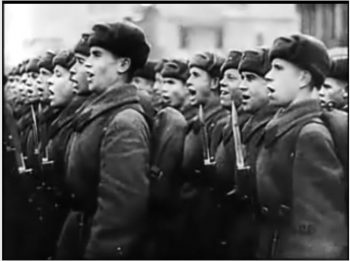Moscow Strikes Back (1942): an extraordinary documentary
Commentary by Patrice Greanville
(Sorry the film is tinted with a strange golden hue, rather common among the experimental renditions of some films of that era. This kind of priceless material should be carefully upgraded by film restorers and curators and given a normal color treatment, clean black and white.)
This film, like others made during this brief period of US/Soviet/Russian cooperation, used the talents of celebrated actors and artists, in this case Edward G. Robinson (né Emanuel Goldenberg in Romania), one of Hollywood's major figures during the industry's "Golden Age". It is notable that as the US quickly pivoted by 1946 to its usual anti-communist stance, congruent with the unfurling of the Cold War (I), the establishment wasted no time in mounting a fierce and virulent anticommunist witch hunt presided by leading political and media figures. In the hysterical atmosphere unleashed by the McCarthy accusations, many well known cinema and literary stars were called to appear before the notorious House committee absurdly charged with combating "anti-American activities" —the HUAC, to pledge their loyalty to the national religion, fealty to capitalism. (The whole thing was a propaganda hoax from start to finish, a fact reflected in the ludicrous chosen name for the investigating committee: "anti-American activities", implying that capitalism and "americanness" were the one and the same thing. (For a discussion of this scandalously false but seldom challenged equation, see my piece, American Brainwash: Guess what, Ma, capitalism is not Americanness!).
The coda below sums up Edward G. Robinson's appearance before the HUAC. It's unfortunate that when it came to choosing between career and principles, many chose the former, and so did Robinson, who formally collaborated with the Committee, not by "naming names", but by going along with the notion that to favor leftist ideas or being a communist, was simply being a "dupe" or worse. The material can be found on Today In Civil Liberties History, a website we recommend.
|
1952
May 1 Actor Edward G. Robinson Confesses to HUAC — “I Was a Sucker”
Robinson’s confession on April 30th was an arranged event designed to “clear” his name regarding accusations of pro-communist activity. Robinson’s name had first come up in December 1950. He denied that he had ever been a member of the Communist Party, but the accusations affected his film career. He appeared in only a few films between 1950 and 1952, a sharp decline from his active and successful career before 1950. After being “cleared,” his film activity returned to its previous level. The Robinson episode was one of HUAC‘s established rituals, in which people would agree to “confess” or even name names in return for receiving HUAC’s blessing. (See Victor Navasky’s classic book, Naming Names). For most, it was a degrading and humiliating ritual. Robinson did not name any names of people he had known who had been Communist Party members. During World War II in particular, Robinson was very active in anti-Nazi and pro-war efforts. Since the Soviet Union was a major U. S. ally in the war against Nazi Germany, many of the more than 800 groups he supported and donated to were left-wing groups, some of which were close to the Communist Party. The people who caved in to HUAC include director Edward Dymtryk (April 25, 1951); writer Martin Berkeley (September 19, 1951); director Elia Kazan (April 10, 1952); and dancer Jerome Robbins (May 5, 1953). Why did people name names? The famed actor/director Orson Wells observed that “Friend informed on friend not to save their lives but to save their swimming pools.” Those who courageously stood up to HUAC include: screenwriter Dalton Trumbo (October 28, 1947); playwright Lillian Hellman (May 21 1952); and Pete Seeger (August 18, 1955). |


